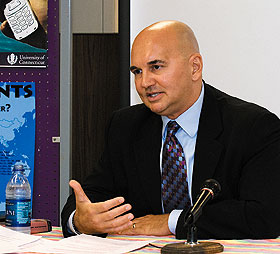  |
| HOME | THIS ISSUE | CALENDAR | GRANTS | BACK ISSUES | < BACK | NEXT > |
HIV/AIDS epidemic largely ignored in U.S., says speaker by Sherry Fisher - September 15, 2008 | ||||
| America’s response to the HIV/AIDS epidemic has been to keep it out of sight and out of mind, according to journalist and author John-Manuel Andriote. That’s because the disease has been associated with groups that have been treated as marginal by society, he says. Andriote made his remarks during a lecture at the Student Union on Sept. 10. The event was sponsored by UConn’s Rainbow Center. He noted that there has been no national AIDS strategy since the HIV/AIDS epidemic was first reported in 1981. “Politically, the epidemic has not been given priority in this country for 27 years,” he said. “When you have a disease that is perceived as afflicting people who are unpopular, who are marginalized because of race, sexual orientation, or socio-economic status, or when you have a disease that can easily be seen as afflicting the ‘other’ and not ‘me’ personally, it is very easy to relegate it to the margins of your own awareness,” he said. Andriote, who came out as a gay man in 1981 when he was in his early 20s, has reported on HIV/AIDS since earning his master’s degree at Northwestern University’s Medill School of Journalism in 1986. His award-winning book, Victory Deferred: How AIDS Changed Gay Life in America, was published in 1999. Andriote said HIV was viewed from the beginning as “a disease affecting the proverbial ‘other’ – the other who is feared, dreaded, the other who is relegated to the margins of awareness. “We don’t want to confront the reality that the bottom line is we’re all human and vulnerable to a deadly microbe that is transmitted through acts of intimacy and pleasure,” he said. “What an incredibly frightening thing to think about.” When HIV was first reported, he said, gay men tried to distance themselves from the disease. They sorted themselves into categories, saying, for example, ‘I don’t have multiple sex partners, I’m not at risk.’ “They found many reasons why they didn’t need to be concerned,” he added.
Andriote said the U.S. Centers for Disease Control has estimated that one quarter of all new HIV infections in the country are the result of people transmitting the virus who don’t know they’re infected. He said the Centers for Disease Control estimate that 56,300 Americans are infected with HIV each year, with the highest numbers among African Americans and Latinos. Gay and bisexual men of all races are still the number one group in the U.S. at risk for HIV, Andriote added. Yet regardless of race or sexual orientation, he said, “HIV is not a disease of identity, it’s a disease of behavior. It’s what you do that puts you at risk.” Andriote knows this first hand. He had been going for HIV tests for 17 years, when in 2005 he got the shock of his life: He went for his annual physical and found out he was HIV-positive. “I had no symptoms,” he said. “Suddenly, what I had been writing about as a journalist became very personal.” Andriote said he should have practiced safer sex. “I got lazy in some ways and played the game of Russian roulette.” He emphasized the need for ongoing HIV/AIDS education and prevention efforts. While medicine has made strides in the management of HIV infection, he said, more targeted and explicit AIDS education and government support is needed. |
| ADVANCE HOME UCONN HOME |

